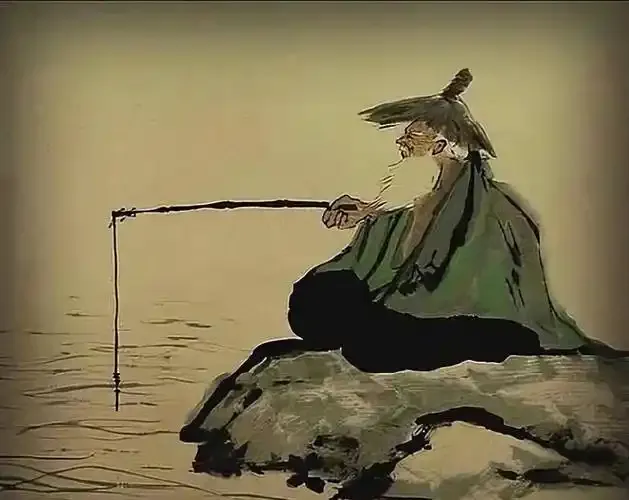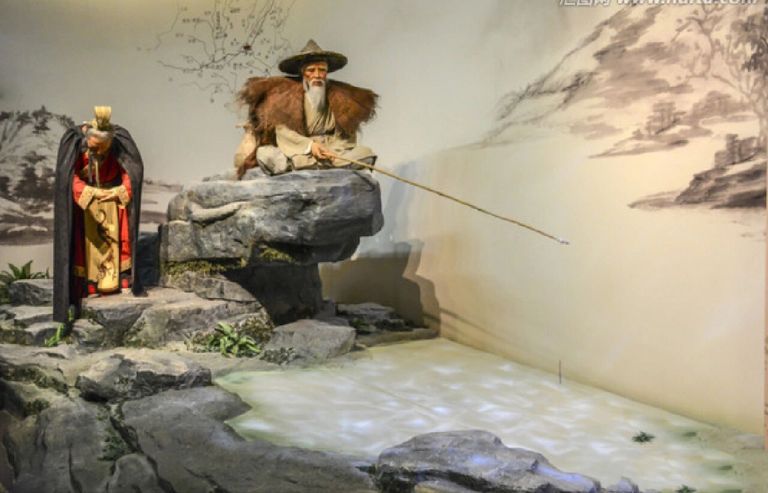
Jiang Ziya, also known as Jiang Taigong or Jiang Shang, a Chinese semi-mythological figure, resided next to the Weishui River about 3000 years ago.
At the end of the Shang Dynasty, King Zhou was debauched and the people were living in poverty. Jiang Ziya couldn't bear to see King Zhou's atrocities and hid by the Weishui River.
The Weishui River was under the jurisdiction of the feudal lord Ji Chang, who held great aspirations and valued talents. In order to attract Ji Chang's attention, Jiang Ziya went fishing by the Weishui River every day, and his fishing method was very unique. The fish hook he used was straight and three feet above the water surface. People who saw it laughed at him, saying that he would never catch fish like this. Jiang Ziya smiled without answering.
Ji Chang heard about this matter and was very curious, so he sent soldiers to investigate. Upon seeing this, Jiang Ziya shouted loudly, "Big fish don't bite the hook, those shrimps come to cause trouble!" After listening to the soldier's report, Ji Chang sent his officials to the edge of the Wei River. Jiang Ziya saw the official's appearance and shouted, "Big fish don't bite the hook, small fish bite the hook randomly!" Upon hearing the report from his subordinates, Ji Chang felt that Jiang Ziya was not an ordinary person, so he personally prepared a generous gift and brought the officials to the edge of the Weishui River, respectfully asking Jiang Ziya to assist him.
Jiang Ziya, seeing that his goal had been achieved, agreed to Ji Chang's request and was granted the title of Grand Duke. Jiang Ziya assisted King Wen of Zhou and his son King Wu of Zhou in establishing the longest dynasty in history - the Zhou Dynasty.
Today, people use this old idiom to describe someone who willingly falls in a trap or does something regardless of the result.
姜子牙,又名姜太公或姜尚,是中国一个神话式的人物。大约3000年前,姜子牙居住在渭水河畔。
商朝末年,纣王荒淫无度,民不聊生,姜子牙不忍心看到纣王的暴行,便躲到渭水边隐居起来。
渭水属于诸侯姬昌的管辖范围,姬昌胸怀大志,爱惜人才。为了引起姬昌的注意,姜子牙特地每天都到渭水边钓鱼,他钓鱼的方式很是奇特。他用的鱼钩是直的,而且还离水面有三尺高,看到的人都笑话他,说你这样永远不会钓上鱼来。可姜子牙笑而不答。
姬昌听说了这件事情,很是好奇,便派兵士来探个究竟。姜子牙一看,便大声说:“大鱼不咬钩,虾米来捣乱!”听了回去的士兵的汇报,姬昌便派手下的官员来到渭水边,姜子牙一看来了当官模样的人,便大声说:“大鱼不咬钩,小鱼乱咬钩!”姬昌听到手下人的汇报后,感到姜子牙不是一个寻常人,便亲自备上一份厚礼,带着官员来到渭水边,恭恭敬敬请姜子牙辅佐自己。
姜子牙见自己的目的达到,便答应了姬昌的请求,被封为太公。姜子牙辅佐即周文王及其儿子周武王建立了历史上最长的朝代——周朝。
这便是成语“姜太公钓鱼,愿者上钩”的来历,后来用以比喻心甘情愿地上别人的圈套或是做事不计后果。
